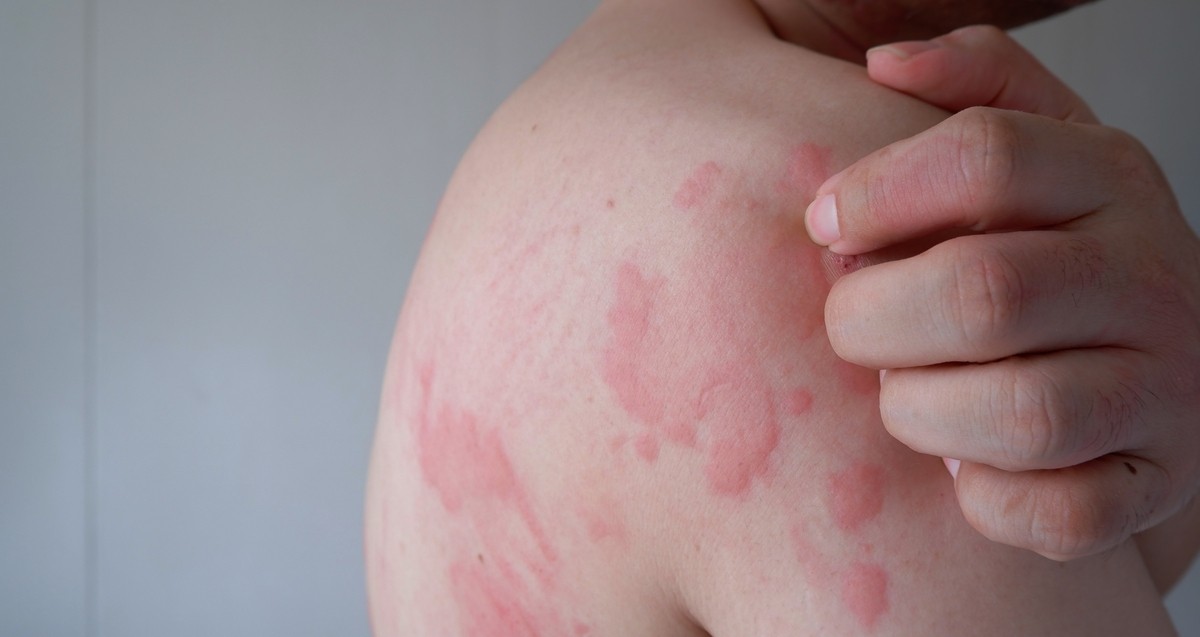Understanding Urticaria:

Introduction
Hives, often referred to as urticaria, are a skin ailment marked by raised, itchy welts that develop on the skin’s surface. The size of these welts varies, and they may combine to create more extensive swollen regions. Twenty percent of people will experience urticaria at some point in their lives; it can be acute or chronic. It is essential to comprehend urticaria’s causes, symptoms, and available treatments in order to effectively manage this frequently painful ailment.
Reasons for Urticaria
Histamine and other substances can cause urticaria, which is characterized by skin irritation and fluid leakage. There are several different potential triggers for this release, such as:
- Allergic Reactions: Typical allergens include latex, insect stings, some foods (such as nuts, shellfish, and eggs), and drugs (such antibiotics and NSAIDs).
- Infections: Urticaria: can be brought on by bacterial, fungal, or viral infections.
- Physical Factors: Physical factors, such as pressure, heat, cold, exercise, and sunlight, can induce physical urticaria, a particular kind of urticaria.
- Stress: The symptoms: of urticaria might be made worse by emotional stress.
- Chronic Illnesses: Rheumatoid arthritis, thyroid disease, and lupus are a few diseases that are occasionally linked to chronic urticaria.
The signs of urticarial
Wheals, or red or skin-colored welts, occur on the skin and are the main sign of urticaria. These whimpers usually
- Range in size from tiny dots to substantial swaths.
- It itch so bad.
- Transform, shift, vanish, and resurface in brief moments.
- may be accompanied by angioedema, a disorder that causes swelling in the throat, eyelids, and lips.
- Less than six weeks are spent with acute urticaria, which is frequently associated with a specific trigger. More than six weeks pass between episodes of chronic urticaria, and the cause is frequently unknown.
Identification
Urticaria diagnosis requires a complete medical history and physical examination. In certain instances, more testing could be necessary to find possible triggers. These examinations may consist of:
- Testing for allergies (skin prick or blood testing).
- Blood testing to eliminate any underlying medical issues.
- In rare instances where the diagnosis is unclear, a skin biopsy.
Options for Treatment
The goals of urticaria treatment are to reduce symptoms and stay away from triggers. Typical therapies consist of:
- Antihistamines: They can help lessen swelling and irritation and are the first line of treatment. It is usually preferred to use non-drowsy antihistamines such as fexofenadine, loratadine, and cetirizine.
- Avoiding Triggers: Urticaria bouts can be avoided by recognizing and staying away from recognized triggers.
- Medication for Chronic Urticaria: Additional drugs such as immunosuppressants, leukotriene receptor antagonists, or H2 antihistamines may be administered for chronic instances.
- Emergency Care: Adrenaline (epinephrine), corticosteroids, and intravenous antihistamines may be needed for severe cases, particularly those involving angioedema.
Way of Life and DIY Solutions
Several lifestyle and home treatments can help manage urticaria in addition to medical treatment:
- Cool Compresses: You can relieve irritation and minimize swelling by applying cool compresses to the affected regions.
- Loose Clothes: Dressing in loose-fitting clothing can help prevent skin irritation.
- Bathing: Taking baths with anti-itch solutions, such as oatmeal or baking soda, can provide relief.
- Stress Management: You can avoid stress-induced urticaria by engaging in stress-reduction practices including yoga, meditation, and deep breathing exercises.
In summary
A common and frequently upsetting condition that can seriously lower quality of life is urticaria. People with this illness can lessen the frequency and intensity of outbreaks by managing their symptoms, identifying their causes, and using the right medications. See a medical expert for a precise diagnosis and customized treatment plan if you think you may have urticaria or if your symptoms are bothersome.

